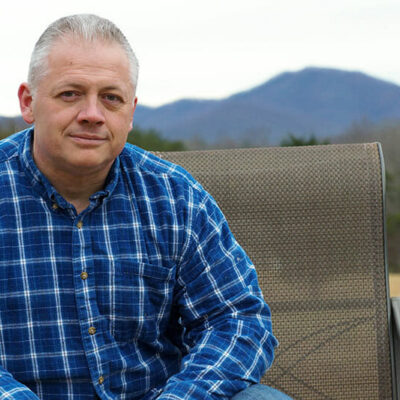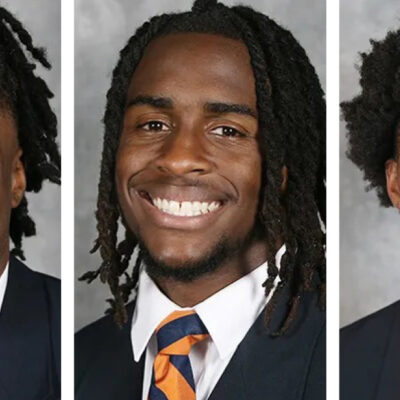After five days of video evidence and harrowing witness and victim testimonies, Judge Cheryl Higgins stoically sentenced former University of Virginia student Christopher Darnell Jones Jr. to five life sentences, plus an additional 23 years, for the 2022 mass shooting that claimed the lives of UVA football players Devin Chandler, D’Sean Perry, and Lavel “Tyler” Davis Jr.
Sentencing began on Monday, November 17, three years and four days after the charter bus shooting that Assistant Commonwealth’s Attorney Richard Farley called “the worst crime in Albemarle history,” as well as Jones’ 26th birthday. He initially faced 13 charges: six counts of aggravated murder—three for the “willful deliberate, and premeditated killing of more than one person as a part of the same act or transaction” and three for doing so within the same three-year period—two counts of aggravated malicious wounding, and five counts of using a firearm in the commission of a felony. In a deal with prosecutors, Jones was allowed to plead guilty to three counts of first-degree murder, two counts of aggravated malicious wounding, and five counts of use of a firearm in the commission of a felony.
Commonwealth’s Attorney Jim Hingeley’s opening statement described an angry young man whose “unfathomable acts of harm” were but a taste of Jones’ true capacity for violence.
“He was assembling an arsenal in his dormitory room for what purpose we cannot imagine,” Hingeley said, referencing the Ruger AR-style rifle, 30-round magazine, and an additional Smith & Wesson semi-automatic handgun found in Jones’ dorm room—a violation of UVA’s policy on firearms. In addition to the two guns, police found a Franklin Arms binary trigger kit, which allows an AR-15 to fire both on trigger pull and release, increasing its rate of fire.
The prosecution’s case, laid out over the first two days of the hearing, centered on both the emotional and the analytical, showing the unimaginable tragedy that Jones’ actions had caused in the lives of three promising young athletes and their families, and characterizing his behavior as cruel, cowardly, and fueled by jealousy, spite, and envy.
The prosecution, through the testimony of survivors and witnesses, disputed an accusation that Jones had made immediately prior to the shooting, and that the defense had made since: Jones had been the subject of bullying from the football players on the trip. Mike Hollins, who escaped the bus that night uninjured but was shot in the back when he returned to try and help his close friend, Perry, denied that any bullying took place.
On day two, survivor Marlee Morgan, the fifth person shot, recounted a massacre in slow motion, as Jones shot the first victim—Davis, with whom Morgan shared a seat—from the gap between the seats. Another victim, Chandler, was shot while sleeping with noise-canceling headphones on.
“It was not just like shot, shot, shot, shot,” she said. “It was long and drawn out.”
She recounted the events on the bus, and how, as she escaped the massacre, she looked down to see blood on her leg and realized she’d been shot in the thigh, with an exit wound toward her buttock. As her testimony neared its end, and she discussed the victims’ families and their grief, the pain and trauma of that night seemingly became too great for Morgan to hide. As she wept, she surprised many in the courtroom by offering forgiveness and hope to Jones, in spite of all he’d put her through.
The prosecution rested on Tuesday afternoon, after painting a detailed picture of a cruel and cowardly murderer, using countless bereaved family members and loved ones as its brushes, and their testimony about their shattered lives as the paint.
With its work cut out for it, the defense began its case on Wednesday, as it attempted to show a more nuanced account of Jones’ life than the simple “bad guy” image so exhaustively rendered by the prosecution. Mental health experts and figures from Jones’ past testified to the abuse and neglect he suffered in his youth, and his drug-fueled paranoia as an adult. They also discussed his work ethic, holding multiple jobs to put himself through school full-time. The victims and their families would at times leave the courtroom in disgust, seeing this testimony as an attempt to make excuses for the inexcusable.
On Friday, both sides laid out their closing arguments, with the prosecution asking for the maximum allowable sentence, and the defense suggesting that there were enough mitigating factors present for the court to show some mercy. Then, to the shock of many, Jones elected to speak for himself in a tearful allocution.
“I’m so sorry. I’ve caused so much pain,” he said. Jones also apologized to the bereaved families directly: “I didn’t know your boys. I wish I did.”
When she returned with her verdict Friday evening, Higgins said Jones’ mental health struggles didn’t diminish his capacity to understand how wrong his actions were. His text messages moments before the shooting acknowledged that he would likely spend the rest of his life in prison. She said the five life sentences were not “vindictive,” but commensurate with the five lives he ended or permanently altered. She also noted the “execution-style” killings against those who couldn’t defend themselves as being factors in her decision.
In an email following the sentencing, public defender Nick Reppucci says that, while the defense recognizes the horror and tragedy that Jones’ actions have caused, it was seeking a sentence that satisfied both the needs of justice and principles of compassion.
“Obviously, Christopher caused horrific and permanent harm,” Reppucci says. “That said, there was substantial evidence that his conduct took place during a period of pronounced mental illness, which resulted in paranoia and cognitive distortions. As a result, his ability to perceive the world around him accurately or appropriately was severely compromised.”
Jones’ other defense attorney, Doug Ramseur, said in an email that he was “still processing,” and not yet ready to issue a public statement. Requests for comments from survivors and their families, as well as the Albemarle County Commonwealth’s Attorney’s Office, were not immediately returned.
Reppucci says it’s too early to know where Jones will serve out his sentence. “The Department of Corrections classifies prisoners based on internal procedures,” he says.






